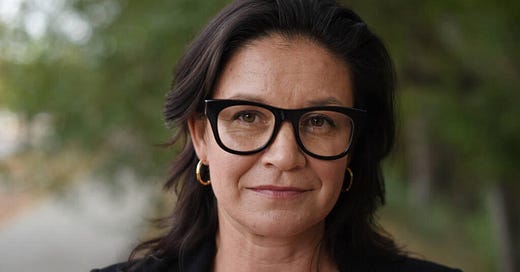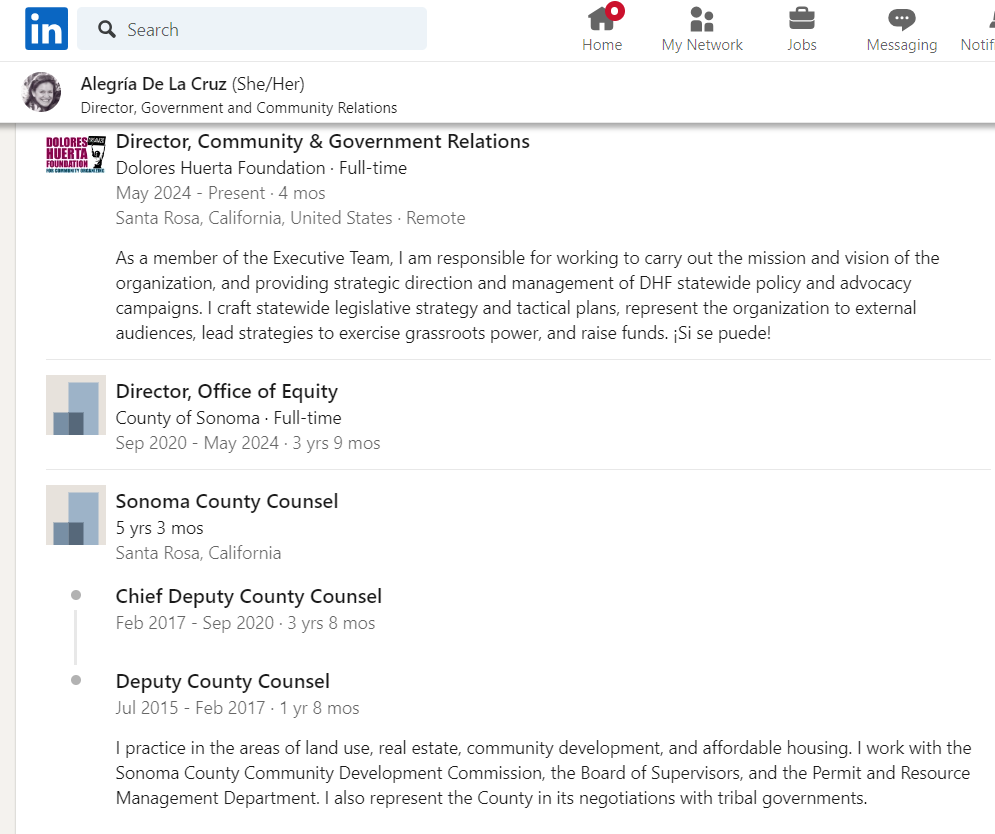Sonoma County's 'Anti-Police' Equity Officer Recruited the Sheriff's Office to Supervise Farmworkers During Fire Evacuations
Sonoma County Equity Officer De La Cruz advised the County Board of Supervisors to implement CA's optional agricultural verification pass program for farmworkers under Sheriff's Office supervision
*Former Sonoma County Equity Officer Alegria De La Cruz (resigned May 2024)
In recent of years, the County of Sonoma was contacted by the Governor’s Office of Emergency Services to confirm if the County would be participating in California’s newly launched, optional Agricultural Access Verification Card Program.
Former Sonoma County Communications Specialist Sylvia Lemus issued the following media statement on behalf of the County’s former Equity Officer Alegria De Cruz & Agricultural Commissioner / Sealer of Weights & Measures at Sonoma County Department of Agriculture Andrew Smith.
Per the Community Alliance with Family Farmers, “The Agriculture and Livestock Pass Identification Card is a form of verification that allows farmers and ranchers to access their properties and tend to their crops and livestock during disaster evacuations when conditions have been deemed safe for return. It may also be known by other names, such as a “Restricted Area Access Pass”. The need for these programs arose as a response to the operational challenges reported by farmers and ranchers who had difficulty accessing their properties during 2018 wildfires in California.”
Within Sonoma County, in the case that a fire or other emergency or disaster occurs and evacuation zones are necessary to manage the emergency, an announcement will be made through SoCo Emergency declaring the Ag Access Verification Program has been activated. Agricultural owner/operators or their employees with valid Ag Access Verification Cards may seek potential access to properties located within a specified evacuation area if deemed safe by law enforcement authorities in consultation with fire and other emergency agencies.
A 2021 article by Food & Environment Reporting Network gave further insight into the dangers of the program:
“When employers apply for an ag pass in Sonoma, they have to describe what farmworkers will be doing on their property—irrigating fields, for example, or picking grapes. That box on the county form is labeled “critical and essential activities.” The Agriculture Commissioner’s Office, which runs the program, hasn’t defined what a “critical and essential activity” actually is. When asked whether his office has ever turned down an employer because his proposed activities weren’t “essential” enough, Smith responded, “Why would we? What reason would we have to do that?”
Last year, Sonoma issued passes for critical activities like giving medicine to a herd of donkeys and watering fruit trees. But passes also were given for activities that seemed less urgent, like tending the garden at a local elementary school and delivering “empty bins” to a winery. At least 44 percent of passes were issued to vineyards for harvesting, and while that’s unsurprising—Sonoma is part of California’s wine country—not everyone agrees that picking chardonnay grapes is worth this kind of risk. Santa Barbara’s ag pass program, for instance, specifically excludes it. “The Santa Barbara program is very explicitly not for agriculturalists to conduct normal agricultural activities, like harvesting or planting,” says Matthew Shapero, a livestock and range adviser with UC Cooperative Extension who helped design Santa Barbara’s program. “It’s really for emergency response”—activities like irrigating crops or feeding livestock.
Sonoma’s ag pass form also asks employers how many people they plan to bring into evacuated areas, but in 2020, employers failed to include that information about half the time. So Sonoma County officials and first responders have no way of knowing how many farmworkers are inside an evacuated area at any given time. That’s also true in neighboring Napa County, whose program didn’t collect any information on the number of farmworkers working inside fire zones in 2020.
“It’s very disconcerting,” says CalFIRE’s Heggie, when told that some counties don’t track how many farmworkers are in mandatory evacuation zones. “I can’t ensure people’s safety if I don’t know how many people I have, where they’re at and what they’re doing.”
Local labor advocates have raised concerns about Sonoma’s ag pass program, and county officials are working on reforming and standardizing it. The Agricultural Commissioner’s Office has drafted a proposal for a new interim program that would address some of the current system’s problems. If it’s implemented, then employers would have to complete a fire preparedness course before they get an ag pass, and the county could restrict how many farmworkers an ag pass holder can bring in.
Meanwhile, the state legislature came up with its own fix: AB 1103, which Gov. Newsom signed in October. The law standardizes pass systems, at least for some farms, and sharply limits who can use them; under the new law, only a farm’s owner or its managers can qualify for a pass and drive into a disaster zone. But after the California Association of Wine Growers opposed the law, legislators narrowed it. Today, it only applies to livestock producers like cattle ranchers. Agricultural outfits like vineyards, orchards, and strawberry fields aren’t covered by the law, which presumably means they can still use county ag passes to shuttle hundreds of farmworkers in and out of fire zones.
Five years ago, a lot of county and state officials had never really heard of an ag pass. Now, CALFire’s Heggie says he and his colleagues are interacting with these programs across California. “Now I have a workforce that’s inside a fire area, that is not trained in firefighting and fire behavior, and now that’s an element of”—he let out a long sigh—”an element of opportunity for things to go wrong.”
American labor leader and civil rights activist Dolores Huerta, President of the Dolores Huerta Foundation expressed her support for the Ag Pass Program by email in July 2022.
*Civil Leader Dolores Huerta
Ironically, former Sonoma County Equity Officer Alegria De La Cruz appeared to serve on the Dolores Huerta Foundation Board at the time. Ms. De La Cruz resigned from the County of Sonoma in May 2024 to take a new role with the Foundation as Director, Community & Government Relations.
On September 19, 2023, a staff report was presented to the Sonoma County Board of Supervisors regarding recommended amendments to the existing Ag Pass Program. The report was made by the Sheriff’s Office, Agriculture/Weights & Measures, Office of Equity, Emergency Management. Staff representatives for each department included: James Naugle, Andrew Smith, Alegría De La Cruz and Jeffrey DuVall.
The Executive Summary included the following language:
“It has been one year since the Board adopted the current Agricultural Access Verification Program. In that time, and as of the date of this staff report was written, the County has not experienced a major wildfire event in which cards issued under the Program were presented and utilized in the field under emergency circumstances. Those who have received cards have obtained safety training and have had certain data collected and information verified, including their identity, connection to a bona fide commercial agricultural operation, and the nature of the critical and essential activities currently allowed in this program for which the card holder may seek access. Because current enrollment likely does not reflect the numbers of persons who may seek access during an emergency event, law enforcement expects significant numbers of agricultural operations to seek access during an event who are not pre-vetted, or individuals who do not evacuate in the first instance, despite evacuation orders.
On June 6, 2023, your Board directed placing an item on the Board’s agenda to allow discussion of the program and alternatives and delegation to the Sheriff. This item reviews the current program and presents various survey data and information on other counties’ programs. It also outlines basic program alternatives and provides a Resolution for program modifications for your Board’s consideration. Included, for Board Policy consideration and not a staff recommendation, is a resolution, that if adopted, would rescind the current program and replace it with a modified program that addresses access for livestock and plant agricultural interests and delegates administration to the Sheriff’s Office. Note, that the Sheriff’s discretion to develop administrative rules, applications, and program materials, and to implement and administer the revised program would be constrained by the parameters set in the attached Resolution, but otherwise would allow for flexibility and an ability to respond to changing needs without returning to the Board.”
Per the minutes, the Board motion was made as follows:
“The Board did not approve amendment or repeal of the Agriculture Access Program as set forth in Resolution 22-0338 adopted on August 30, 2022. On a 3-2 motion (Rabbitt, Gore and Hopkins yes, Coursey and Gorin no), without amending Resolution 22-0338, the Board voted to delegate authority to the Sheriff’s Office to determine critical agriculture activities to include harvesting. The Board gave direction to staff to conduct community engagement prior to bringing back further program revisions.”
Just three days ago, on August 23, 2024, The Press Democrat released an article regarding the dangers from poor air quality affecting laborers:
“New research on the dangers agricultural laborers face as climate change contributes to larger, more frequent wildfires has rekindled criticism of Sonoma County policies that researchers say prioritize wine industry interests over worker health.
The study collected data from the 2020 North Bay wildfire season, when the lightning-sparked LNU Complex Fire and the Glass Fire burned for more than two smoke-filled months. The data show there were 17 days when workers were allowed onto vineyards and farms under the county “Ag Pass” program even though air quality in those areas was deemed unhealthy even for hardy individuals.”
“At the time, public agencies urged residents to reduce prolonged or heavy exertion because of the smoke, and mandatory evacuations were in force. However, agricultural workers, mostly Latino and Indigenous, were allowed into evacuation zones to pick grapes and perform other agricultural tasks as the air burned their eyes, throats and lungs, researchers said.
Fine particulate matter ― tiny particles that can be drawn deeply into the lungs and even the bloodstream ― remained elevated at night, when fire activity typically declines. Much of the grape harvest is carried out in the dark, in cooler temperatures, which further increased the risk of short- and long-term health effects, including higher mortality rates.
The study, published last week in the American Geophysical Union journal GeoHealth, is the latest in a series of papers and policy briefs focused on Sonoma County agricultural workers and the 2020 wildfires, which overlapped harvest season.”
The former Sonoma County Equity Officer Alegria De La Cruz simultaneously served as a Trustee for the Santa Rosa City Schools (SRCS) Board. Although she is up for reelection this year, the incumbent will not be running once more.
Ms. De La Cruz’s legacy at SRCS has been controversial through her advocacy to remove School Resource Officers on campus. Although the lack of school safety was emphasized by students, parents and staff, Trustee De La Cruz claimed that black & brown students are afraid of police. She further claimed that the presence of SRO’s is the gateway to the school-to-prison pipeline.
On December 15, 2023, The Press Democrat published an article which highlighted Ms. De La Cruz’s sentiments surrounding SRO’s on campus.
“The board also unanimously endorsed De La Cruz’s proposal to study formation of alternative education programs, including small school environments that could cater to the needs of the most troubled kids.
That came after some pointed back-and-forth between audience members and De La Cruz, who told audience members they needed to educate themselves.
“Take ethnic studies,” she said. “Understand the root causes of these systems … Be educated. Be educated in our history.”
At that point several audience members interjected and asked her why some of the alternative proposals she favored had not been implemented.
“We have the capacity and we have the space to create alternative systems within Santa Rosa City Schools tomorrow,” she said.
“Then do it! Then do it!” several audience members said. De La Cruz rose and stepped away from her seat, returning minutes later.”
At any point in time while employed as Sonoma County Equity Officer, Ms. De La Cruz had the opportunity to speak out against the implementation of an Ag Pass program under Sheriff oversight. Her views regarding local law enforcement appear to differ drastically between her roles with SRCS and the County. Does Ms. De La genuinely support the best interests of ‘BIPOC’ groups in Sonoma County, or is she being compensated to push democratic political hypocrisy?
“Any time you throw your weight behind a political party that controls two thirds of the government and that party can’t keep the promise that it made to you during election time and you’re dumb enough to walk around continuing to identify yourself with that party, you’re not only a chump but you’re a traitor to your race.”
-Malcolm X













